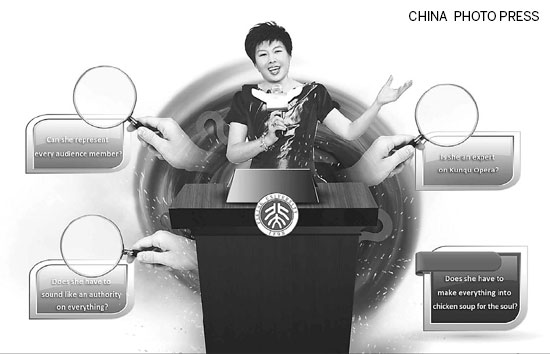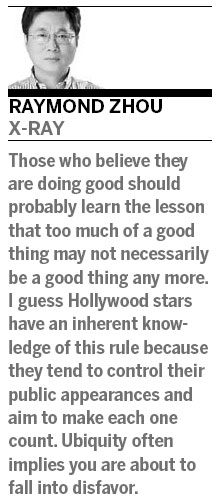When a star loses its luster
Updated: 2012-12-09 09:16
By Raymond Zhou (China Daily)
|
||||||||

Idolatry is a double-edged sword. It makes and breaks a celebrity with the same swiftness and irrationality. Going with the flow can end up in a vortex, as Yu Dan and other cultural luminaries may have found out.
The first sign that a celebrity has reached the peak of his or her fame and has started descending is usually so subtle as to be imperceptible. In Yu Dan's case, it came as a bang, or more accurately, a loud call of disapproval.
Related: Blessed month for movie lovers
In a recent public address, the eloquent and elegant talking head was booed off the stage. Was the audience too rude or had she overstayed her welcome?
Yu, a professor at Beijing Normal University, was thrust upon the public with her television lectures during the 2006 National Day holiday when a larger-than-usual audience was at home and tuned in.
Professor Yu looked nothing like a dour matron. Instead, she was vivacious. She gave a spin on Confucius' Analects that made it folksy and accessible. Perhaps a bit too much. Some of her interpretations were laughed off by serious scholars, but they helped her sell millions of copies of her books. Even an English-language version has become available titled Confucius from the Heart: Ancient Wisdom for Today's World.
From then on, she has been a constant fixture on the nation's tube, doling out spoonfuls of chicken soup on every topic imaginable. Obviously, television is the fastest channel to mint a new celebrity. But it is also the most effective means to destroy one. Overexposure could have paved the way for the sudden onslaught of massive discontent.
For the same reason, there are two songs I never want to hear for the rest of my life. One is the Titanic theme song, and the other the official song for the 2008 Beijing Olympics.
Both are easy on the ear and by no means objectionable in themselves. When the movie debuted in China in 1998, every store on every street blasted the tune, including horrible cover versions by mediocre singers. Now, whenever the melody comes up, I want to throw up - to the point that even during a Celine Dion concert I had to sit out this number.
By some holy ordinance, the Olympic song has been playing non-stop in the Olympic Park for the past four years and more, and I happen to live near by. You can imagine how an instant hit turned into a constant pain in my ears.
Back to Professor Yu. Her "little incident" at the Peking University podium was more complicated than the mere sentiment of "I love you too much and now I hate you".
She was giving a pep talk after a gala show featuring some of China's foremost Kunqu Opera stars. She thanked "these old artists on behalf of everyone in the audience", at which point the first hoot was heard.
The Chinese word "to represent" has riled feathers before. Public figures are in the habit of spouting forth such cliches, but the public has become more aware they have not given the right to the celebrities to represent them in the first place.
In English, people would say "I believe I speak for all of us when I thank these artists", and there is a hesitancy in the tone as if to ask for permission or wait for a different opinion. In Chinese, the term is resolute.
Another reason Yu received the catcall, according to press reports, was the audience believes she was again pontificating on something outside her realm of expertise. But this time, the audience was wrong. Yu is a lifelong lover of Kunqu Opera and has penned a book on it. She has been promoting this ancient form of Chinese performing arts for a long time.
When a person or a cause or a slogan or a song has reached saturation point, it does not take much to bring it down. People are so fed up with it, anything can serve as an excuse to vent their antagonism. Those who oppose it can even resort to lies to fire up a volley of dissent.
Those who believe they are doing good should probably learn the lesson that too much of a good thing may not necessarily be a good thing any more. I guess Hollywood stars have an inherent knowledge of this rule because they tend to control their public appearances and aim to make each one count.
Ubiquity often implies you are about to fall into disfavor.
Yu is not the first Chinese celebrity to suffer the fate. Yu Qiuyu, a prominent scholar on theatrical arts who chanced onto fame by writing information-dense travelogue-style essays, transformed himself from a best-selling author into an authority on all subjects cultural. Only when he appeared on television did his authoritative tone begin to turn people off.
For more coverage by Raymond Zhou, click here

 'Taken 2' grabs movie box office crown
'Taken 2' grabs movie box office crown
 Rihanna's 'Diamonds' tops UK pop chart
Rihanna's 'Diamonds' tops UK pop chart
 Fans get look at vintage Rolling Stones
Fans get look at vintage Rolling Stones
 Celebrities attend Power of Women event
Celebrities attend Power of Women event
 Ang Lee breaks 'every rule' to make unlikely new Life of Pi film
Ang Lee breaks 'every rule' to make unlikely new Life of Pi film
 Rihanna almost thrown out of nightclub
Rihanna almost thrown out of nightclub
 'Dark Knight' wins weekend box office
'Dark Knight' wins weekend box office
 'Total Recall' stars gather in Beverly Hills
'Total Recall' stars gather in Beverly Hills
Most Viewed
Editor's Picks

|

|

|

|

|

|
Today's Top News
Health new priority for quake zone
Xi meets US top military officer
Japan's boats driven out of Diaoyu
China mulls online shopping legislation
Bird flu death toll rises to 22
Putin appoints new ambassador to China
Japanese ships blocked from Diaoyu Islands
Inspired by Guan, more Chinese pick up golf
US Weekly

|

|







